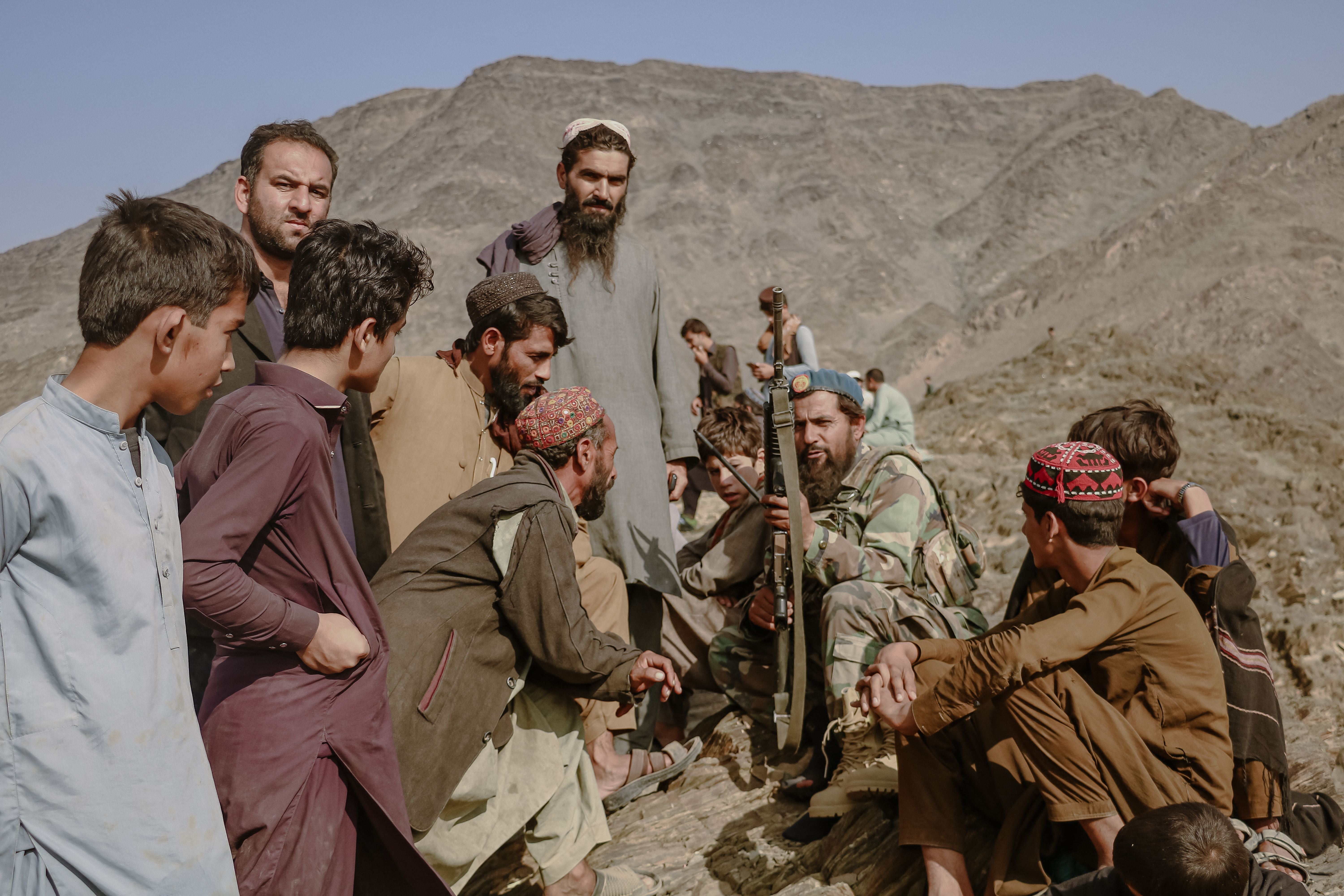Defiant in betrayal, Afghanistan’s pro-democracy leaders still see a future without the Taliban
Ex-warlords, resistance fighters, diplomats and politicians gather together united by a single cause: how to oust the ultra-fundamentalist group that threatens regional stability and treats women as a subservient class. Arpan Rai reports from Dushanbe, Tajikistan


Forced to gather in exile, Afghanistan’s resistance movement is working in the shadows on ways to oust the Taliban from its grip on Kabul, knowing it can no longer trust or rely on the Western allies who so hastily pulled out of the country in August 2021.
There is bitterness on display here at the Herat Security Dialogue in Dushanbe, the capital of neighbouring Tajikistan, but this unusual gathering of former ex-warlords, resistance fighters, diplomats and politicians is united by a single cause: a future for Afghanistan without the Taliban.
Perhaps the star guest at the talks is former Mujahideen leader Ismail Khan, dubbed the “Lion of Herat” for his involvement in fighting the Soviet invasion of the 1980s, who supported the government against the Taliban up until he was captured in August 2021.
Khan tells the conference that the outside world only appears to have raised concerns about the Taliban’s misogynistic social policies, and forgotten the fact that Afghanistan will become a breeding ground for terrorism under the group’s rule. Earlier, The Independent reported a warning from Afghanistan’s former spy chief, Rahmatullah Nabil, who told the summit that the Taliban was trying to get its hands on a tactical nuclear weapon.
“The West is watching the Taliban close schools and ban education [for girls], but it doesn’t know that it is a curse for the international community as well,” Khan warns.
The withdrawal of allied forces was a lesson, Khan says in an interview with The Independent on the sidelines of the summit. Afghanistan is no longer counting on anyone, especially not the West, to help sort out its problems, he says.
“We don’t believe the West will be injecting peace or any truce agreement in Afghanistan anytime soon. Ideally the international community should do more, but the resistance leaders are not counting on the US and Nato anymore.”
The Taliban claims to control all 34 provinces of Afghanistan by force, but while the attention of the world is largely on conflicts elsewhere, the fighting in Afghanistan continues regardless. Representatives of various groups at the summit say anti-Taliban forces are carrying out daily raids and offensives on Taliban positions, and there are as many as 22 different resistance groups still active in guerilla operations in the country.
“The resistance groups are growing stronger and stronger, and if the war approaches them, they are ready,” says Khan, who is now residing in his own exile in Iran.
The talks in Dushanbe last week were hosted by the Afghan Institute for Strategic Studies (AISS), formerly a Kabul-based think tank, and included a wide range of stakeholders in Afghanistan’s future, with representatives from the US, the UK and the EU in attendance. Participants discuss how reclaiming the country from the Taliban will require broad-based support from Afghan society, not just a military solution – but they are also under no illusions that the Taliban will simply give up power through diplomacy.
“We have to prepare for a civilian and political movement to resist the Taliban from inside the country and outside. Armed resistance in Afghanistan is not our choice but it is what the Taliban is imposing on us. They are not ready for talks,” says Dr Rangin Dadfar Spanta, former foreign minister of Afghanistan under the Hamid Karzai administration and the chair of AISS’s advisory board.
He fears that the international community may be willing to overlook social principles for the sake of having a stable partner to deal with in Kabul. “We want civilian rights, absolute gender equality, the realisation of women’s rights for Afghanistan, and that is clashing with the geopolitical needs of the West, and even China and Russia,” he says.
Khan says ousting the Taliban from Afghan soil is the top priority, but he won’t compare the situation to Ukraine, where a single country’s forces fight with the ideological, military and financial support of a large bloc of international backers.
“We don’t want to ask anyone for money and arms because we are standing for the principles and rights of millions of Afghans. Ukraine can ask, they are fighting a different war, but for us, we will stand by the people of our country and do whatever they need,” Khan says.
The remnants of the National Resistance Front (NRF) of Ahmad Shah Massoud, the dreaded warlord who defeated the Soviets in the 1990s, were also represented at the talks. Ali Maisam Nazary, head of foreign affairs for NRF, says that Afghans will ultimately decide their future, and that the movement to reinstate a legitimate people’s government is not dependent on the decision of any foreign country.
“Our effort is to prove that the Taliban is fragile; both militarily and politically. Our priority is to put pressure on the enemy and keep the hope for victory alive,” he tells the conference.
One powerful tool for the resistance movement is the extent to which the Taliban’s policies are so damaging for Afghans themselves. Atefa Tayeb, a female politician who served as a deputy minister in the Ghani administration, says such oppression cannot last forever. “Unfortunately, decision-makers and political leaders in Afghanistan consider women and politics as separate entities. Even with continuous oppression by the Taliban, women of Afghanistan continue their fight for freedom,” she says.
But while those assembled in Herat agreed that the movement to oust the Taliban must be self-reliant, they did have some messages for the international community, especially the US which continues to pump $40m into Afghanistan per week, without any paper trail of where the money is going and how much of it is handled by the Taliban.
“Why are the stringent accountability mechanisms which Kabul saw in the Nato rule now relaxed when it comes to the Taliban?” asks Shoaib Rahim, former acting mayor of Kabul who is now an associate professor at the American University of Afghanistan in Toronto. “There is a concerning double standard in donor engagement.”
Michael Semple, former deputy representative of the European Union in Afghanistan, says the US is committing a “catastrophic political failure” by sending $2.3bn in aid to an extremist group.
For now at least, the anti-Taliban resistance is helped by the fact that the UN has refused to recognise the Islamist group as the legitimate government of Afghanistan. All countries are currently following this example, although some major powers – including Russia, Iran, China and Turkey – have reopened their embassies in Kabul and are increasingly dealing with the de facto authorities there.
Khan says there would be “severe” consequences to granting the Taliban any more legitimacy, “not just for Afghanistan and the region but also beyond”.
Said Tayed Jawad, the former Afghan ambassador to Washington, London and Moscow, said forging ties with an ultra-fundamentalist group like the Taliban, which has its origins as a terrorist movement, would be a mistake.
“I have constantly told my friends in Moscow and Washington during my tenures that the policy of banking on one Islamist terrorist organisation to fight another Jihadi terrorist group has historically proven to be counterproductive and very dangerous,” he says. “Why engage with the Taliban if they don’t meet [your] standards? There’s no reasonable return.”






Join our commenting forum
Join thought-provoking conversations, follow other Independent readers and see their replies
Comments